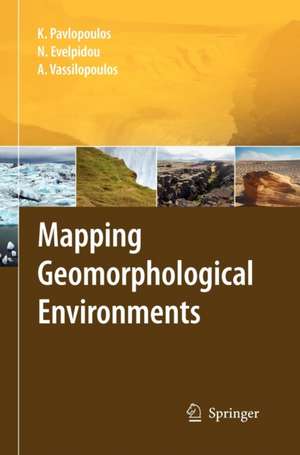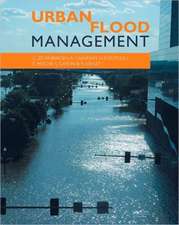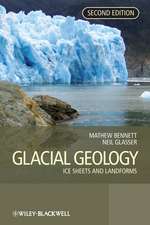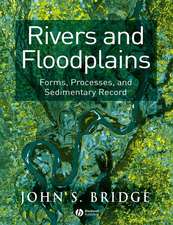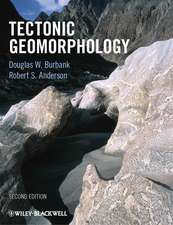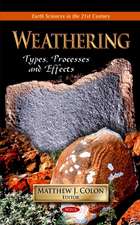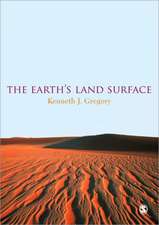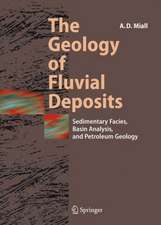Mapping Geomorphological Environments
Autor Kosmas Pavlopoulos, Niki Evelpidou, Andreas Vassilopoulosen Limba Engleză Hardback – 9 iul 2009
Its holistic approach seeks to provide a meaningful linkage between state of the art techniques for geomorphological mapping, including the latest innovations in geospatial applications, and advances in the understanding of the formation of geomorphological phenomena in a variety of settings and environments.
The book includes: - An introduction to the processes which form geomorphological formations and how to map them. - Case studies from a variety of environments with many examples of geomorphological maps. - In-depth descriptions of the latest tools and methodologies such as field sampling, GPS usage, 3–4D mapping, GIS analysis, digital image analysis, etc. - A list of the geomorphological characteristics per environment (e.g. coastal,fluvial, etc.) in the format of a geomorphological encyclopaedia, with pictures, maps and symbols.
It covers the entire workflow ranging from data collection, analysis, interpretation, and mapping.
Acknowledgements
All authors would like to acknowledge the contribution of Dr. John W.M. Peterson, School of Computing Sciences, University of East Anglia, Norwich, UK, for corrections and improvement to the English text..
Università Telematica Guglielmo Marconi (UTGM) and ENEA acknowledge the collaboration of CUTGANA (Centro Universitario per la Tutela e la Gestione degli Ambienti Naturali e degli Agroecosistemi), Università di Catania, for the paper on "The Cyclops Islands".
IRMCo acknowledges the use of the Integrated Land and Water Information System (ILWIS), developed by ITC, the Netherlands, for the management and assessment of geographic information in a GIS environment. ILWIS functionality was employed for the paper on "The natural heritageof the Island of Gozo" and the paper on "The geomorphological cave features of Ghar il-Friefet".
IPB (Polytechnic Institute of Bragança) wishes to acknowledges all those colleagues, most of them also members of CIMO (Centre for Mountain Research), that contributed to the recently issued Management Plan of Montesinho Natural Park (PNM). Their hidden contribution to the articles concerning PNM is much acknowledged. A word in recognition of his endless and contagious enthusiasm towards Montesinho and to the Mountain domain, spread among us all in the IPB, is due to Professor Dionísio Gonçalves, the first Director, Coordinator and President of PNM, CIMO and IPB, respectively. The authors of the photos inserted in the articles concerning Montesinho are also much acknowledged for their contribution.
| Toate formatele și edițiile | Preț | Express |
|---|---|---|
| Paperback (1) | 385.62 lei 6-8 săpt. | |
| Springer Berlin, Heidelberg – 23 aug 2016 | 385.62 lei 6-8 săpt. | |
| Hardback (1) | 399.07 lei 6-8 săpt. | |
| Springer Berlin, Heidelberg – 9 iul 2009 | 399.07 lei 6-8 săpt. |
Preț: 399.07 lei
Nou
Puncte Express: 599
Preț estimativ în valută:
76.36€ • 80.09$ • 63.57£
76.36€ • 80.09$ • 63.57£
Carte tipărită la comandă
Livrare economică 01-15 aprilie
Preluare comenzi: 021 569.72.76
Specificații
ISBN-13: 9783642019494
ISBN-10: 3642019498
Pagini: 252
Ilustrații: XIII, 236 p.
Dimensiuni: 170 x 244 x 18 mm
Greutate: 0.68 kg
Ediția:2009
Editura: Springer Berlin, Heidelberg
Colecția Springer
Locul publicării:Berlin, Heidelberg, Germany
ISBN-10: 3642019498
Pagini: 252
Ilustrații: XIII, 236 p.
Dimensiuni: 170 x 244 x 18 mm
Greutate: 0.68 kg
Ediția:2009
Editura: Springer Berlin, Heidelberg
Colecția Springer
Locul publicării:Berlin, Heidelberg, Germany
Public țintă
ResearchCuprins
Methodology-Techniques.- Fluvial Environments.- Coastal Environments.- Lacustrine Environments.- Glacial Environments.- Karstic Environments.- Volcanic Environments.- Aeolian Environments.- Surface Landforms.- Topography, Lithology and Tectonics.- Geomorphological Mapping (Case Studies).
Recenzii
From the reviews:“This book by Pavlopoulos (Harokopian Univ. of Athens), Evelpidou (Univ. of Athens), and Vassilopoulos (GeoEnvironmental Institute, Athens) is a concise review of the techniques of geomorphological mapping, and the processes and features characteristic of certain geomorphic environments. … In all, the line drawings and photos are very good. … Upper-division undergraduates and above.” (I. D. Sasowsky, Choice, Vol. 47 (5), January, 2010)
Caracteristici
Covers the entire workflow ranging from data collection, analysis, interpretation, and mapping to introducing the processes which form geomorphological formations and mapping Incorporates case studies from a variety of environments with many actual examples of geomorphological maps Describes in-depth the latest tools and methodologies such as field sampling, GPS usage, 3–4D mapping, GIS analysis, digital image analysis, etc. Enumerates geomorphological characteristics per environment (e.g. coastal, fluvial, etc) in the format of a geomorphological encyclopaedia, with pictures, maps and symbols Includes supplementary material: sn.pub/extras
